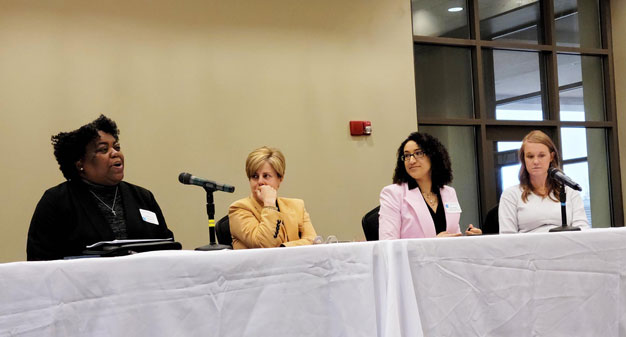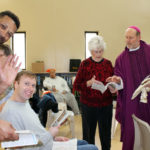
From left, Christine Brannon-Dortch, deputy director for region one at the Illinois Department of Corrections; Laura Ekizian, president and chief relationship officer at Quad City Bank and Trust; Jazmine Constantino, account manager at The Marketing Arm and recently Windy City Bulls; and Erin Marsh, program manager at Russell Construction, take turns speaking about working in male-dominated fields at a women’s conference March 31 at St. Ambrose University in Davenport.
By Anne Marie Amacher
The Catholic Messenger
DAVENPORT — Promoting education and action for human rights and for the fair and responsible use of resources were focuses of the Ambrose Women for Social Justice annual conference. Organizers also encouraged participants to recognize the need to identify, assess and address the ways in which injustice affects all human beings. The annual women’s conference, held March 31 in the Rogalski Center on the St. Ambrose University campus, was part of the Re/Building Community series.
Panel discussions focused on women in politics, women in social justice, gender activism and women in male-dominated fields. Keynote speaker Ann McGlynn is founder and executive director of Tapestry Farms.
Among the panelists featured in the social justice discussion were Tracy Singleton of the Lincoln Center in Davenport, Mayra Hernandez of Quad Cities Interfaith (QCI) in Davenport, Ann Schwickerath of Project Renewal in Davenport, Karen VanDeCasteele of Humble Dwellings in Eldridge and Laura Fontaine of World Relief in Moline, Illinois.
Each woman talked about how their organization’s work affects people — Black, Hispanics, immigrants, refugees and people with low-income or in need of assistance, among them. “We want to establish a presence, develop relationships and be all about community,” Singleton said. Hernandez said the focus at QCI is to develop and identify leaders in the community. “I don’t speak for them. I give them the training to speak up at council or board meetings. To tell their stories and to give solutions to problems.”
Schwickerath spoke of the importance of showing love and compassion to everyone and serving as a role model for others. VanDeCasteele said her organization started out helping one man and since then has helped dozens of families to make a house (or apartment) a home. Fontaine pointed out that World Relief works to help refugees settle in the region and to become self-sufficient. “We empower and educate people. There is a lot of miscommunication out there. Refugee families want to be self-sufficient. They want to work.”
All five speakers responded to a question about the needs of their specific organizations. “I get lots of mail asking to give, give, give” a woman in the audience said. “I have been inspired by you. How can I help you? I am a person of the community and have never heard of you (any of the organizations.)”
Presentations at area churches on how parishes can help is one idea, Fontaine suggested. World Relief needs volunteers to welcome refugees at the airport, provide transportation and help them to learn English, among other skills. VanDeCasteele said Humble Dwellings needs volunteers, especially men, to do some heavy lifting. Schwickerath encouraged people to call or visit Project Renewal. “You can do what you want. Come by and see where you fit in best. It’s fun to share your talents and skills.”
Hernandez said Quad Cities Interfaith is open to speaking at churches to offer ideas on how each individual can help. Singleton encouraged people to visit the Lincoln Center. “See who we are, what we are doing.” Volunteers can clean, paint or help build up the library.
During the session on women in male-dominated fields, four panelists shared how women can reach higher levels at companies but often lack confidence about their qualifications. Speakers were Christine Brannon-Dortch, deputy director for region one with the Illinois Department of Corrections; Laura Ekizian, president and chief relationship officer at Quad City Bank and Trust; Jazmine Constantino, account manager at The Marketing Arm and recently Windy City Bulls; and Erin Marsh, program manager at Russell Construction.
Constantino said, “Never underestimate the power of networking.” Ekizian agreed. “Even if you don’t remain here, you won’t believe how reaching out can lead you to something new in your life.”
Marsh said relationships and networking are essential. After she decided she did not want to go into teaching, a friend helped her get a job, which led to her career in construction — an occupation she would otherwise not have considered.
Brannon-Dortch advised women to keep up with training (even on their own), to have a strong work ethic and treat others fairly. These efforts can lead to “great opportunities.” Women should accept opportunities that appeal to them rather than risk a missed opportunity.
The business leaders did not feel looked down upon or treated differently because they are women. Ekizian said she writes emails in full sentences. “Men typically just forward without a comment. It’s my communication style to add something.” Brannon-Dortch said she, too, writes in full sentences. “I just don’t approve things. I write with purpose.” Marsh’s experiences working in construction are good. “I hear (from men) that women are more organized and pay attention to detail.”
Constantino started out simple — volunteering to pass out water and helping at sports events. Eventually she worked in sales, group sales, group events and then sponsorships. She has as much access at events as do her male counterparts – except to the locker room, she laughed.
McGlynn talked about how Tapestry Farms, the nonprofit urban farm system she founded, invests in refugees who come to the Quad-City area. She shared stories of a refugee family relocating from Afghanistan and another from the Congo adjusting to life in the U.S. and eating traditional foods from those countries. The road she travels with Tapestry Farms has not always been easy. “I realized how little I knew. We made mistakes along the way, yet there is also joy.” Verbal communication can be challenging early on for non-English speakers, but she said she smiles and laughter make the day. “We are creating community.”
McGlynn talked about the systems that work well with Tapestry Farms such as Community Healthcare, which helps arrange translators. Some organizations do not have translators, which causes frustrations, as does completing online forms and applications. The transportation system “is not great,” she said. Still, “There is hope and there is community.”











